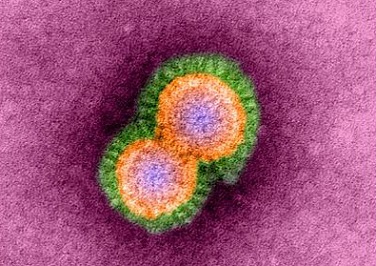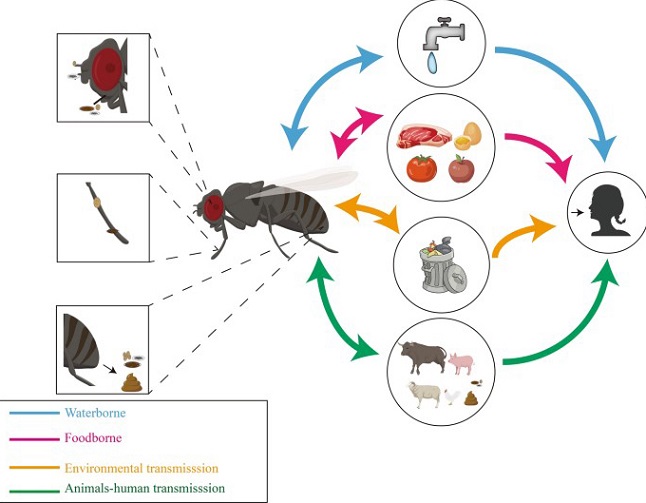WARNING! H5N1 And Other Avian Flu Viruses Can Be Spread By Insects Such As Mosquitoes, House Flies, Beetles, Cockroaches, Etc!
Nikhil Prasad Fact checked by:Thailand Medical News Team Apr 20, 2024 1 year, 9 months, 3 weeks, 2 days, 20 hours, 2 minutes ago
H5N1 News: It is interesting that as H5N1 wreaks havoc around the globe, killing birds, poultry, small mammals and even certain sea-life and now dairy cows, scientists and health authorities have overlooked one important life form that can also assist in the spread of H5N1 – insects! (No, I am not referring to the illegal immigrants in North America or Europe but rather real insects!)
 H5N1 And Other Avian Flu Viruses Can Be Spread By Insects Such
H5N1 And Other Avian Flu Viruses Can Be Spread By Insects Such
As Mosquitoes, House Flies, Beetles, Cockroaches, Etc!
Unknown to many, insects such as mosquitoes, house flies, beetles, locust, cockroaches, etc are efficient vectors not only for H5N1 but also other Avian flu viruses and can help spread the virus from birds to other birds, poultry, pigs, cats, dogs, other animals and even humans.
With the newer emerging strains of H5N1 literally just about one mutation or so from evolving into a viral pathogen that can efficiently transmit from humans to human, it is important that all possible forms of transmissions and also spread are carefully monitored and studied.
Various
H5N1 News coverages at present are focusing on the emergence of H5N1 in various dairy farms in the United States but strangely no one has bothered to explore the possibility that insects such as houseflies, blow flies and mosquitoes that are rampant on these farms could be playing a key role in the transmission of the H5N1 virus!
Insects As Vectors For H5N1 And Other Avian Flu Viruses.
H5N1 and other avian flu viruses can spread by multiple pathways such as from humans or birds touching contaminated surfaces and in air droplets or dust particles in the air. However, another route of the virus spread is through insect vectors. It is not the main mode of spread, but a reduction in all potential modes can lead to improved outcomes and reduced viral transmission potential to poultry and people. Poultry producers, swine farms and dairy farms especially need to be diligent with biosecurity in a variety of ways including the management of insect vectors.
Typically, insect vectors can encounter external sources of avian influenza by landing on infected wild bird feces and then transmitting the virus to other bird flocks. Insect vectors can also transmit virus particles between commercial facilities and even directly to other animals and even human.
Beetles, Flies and Mosquitoes Are Actually Common Insect Vectors for Poultry, Swine and Cattle
In one study, mosquitoes in a H5N1 infected poultry farm in Thailand were found with the avian flu virus. The virus was even found to be replicating in the bodies of the mosquitoes!
https://www.liebertpub.com/doi/10.1089/vbz.2007.0142
In another study in Thailand, houseflies were found as vectors of H5N1 avian flu virus, carrying and transmitting the virus to chickens in a poultry farm
ioone.org/journals/avian-diseases/volume-57/issue-2/10347-090412-Reg.1/Experimental-Assessment-of-Houseflies-as-Vectors-in-Avian-Influenza-Subtype/10.1637/10347-090412-Reg.1.short">https://bioone.org/journals/avian-diseases/volume-57/issue-2/10347-090412-Reg.1/Experimental-Assessment-of-Houseflies-as-Vectors-in-Avian-Influenza-Subtype/10.1637/10347-090412-Reg.1.short
Yet another Thai study in 2010 under experimental conditions this time round demonstrated that houseflies could serve as carriers of H5N1 virus.
https://resjournals.onlinelibrary.wiley.com/doi/10.1111/j.1365-2915.2010.00928.x
A Japanese study showed that blow flies were also capable of transmitting H5N1 virus.
https://www.hindawi.com/journals/irt/2011/652652/
Another recent Japanese study done in December 2022 also found that blowfishes can help spread bird flu.
https://www.japantimes.co.jp/news/2024/01/08/japan/flies-bird-flu-virus-carrier/
An Indonesia study in 2016 validated that houseflies could serve as carriers of H5N1 virus.
https://ojs.unud.ac.id/index.php/jvet/article/view/22119
Danish studies gave also showed that houseflies which are commonly found in poultry, swine and cattle farms are carriers of other Avian flu viruses such as H5N7 and H7N1.
https://academic.oup.com/jme/article/48/3/608/883650
North Carolina University in the United States also found that houseflies were carriers of various viruses including Newcastle Disease virus and also even avian flu viruses and are the culprits behind outbreaks in bird flocks and poultry farms.
https://www.thepoultrysite.com/news/2007/07/houseflies-can-spread-bird-flu-virus-study
In fact, that it suspected that many bird flocks are possibly getting infected as a result of feeding on live of dead infected insects.
A Germany study proposed that insects could serve not only as vectors but also reservoirs of avian flu virus including H5N1.
https://biologydirect.biomedcentral.com/articles/10.1186/s13062-020-00272-5
 Houseflies can cause the transmission of viruse through many modes.
Houseflies can cause the transmission of viruse through many modes.
Aside from H5N1 and avian influenza, insects can also vector other disease-causing pathogens such as bacteria like E. coli, and salmonella, viruses like Marek’s disease virus, infectious bursal disease virus, and even fungal pathogens like Aspergillis spp. The most cited insect vectors are filth flies and darkling beetles.
Biosecurity Precautions
It should be noted that improving biosecurity relating to insect vectors starts with integrated pest management (IPM) including cultural, physical, biological and lastly chemical options.
Importantly, cultural control and sanitation should be a key priority. It is critical to reduce the conducive conditions such as the insect’s food, water, and harboring or resting areas. Consequently, physical control such as exclusion strategies should be implemented. Sealing all possible entry points for these insects so they can’t get into the facility is important.
Next, biological controls can be implemented such as adding parasitoid wasps, but if pesticides are also used as a control strategy this needs to be thoughtfully done to reduce harm to the parasitoids aiding in management of the pests.
While pesticides are an effective tool, they should be the last alternatives. They should only be deployed once all cultural, biological, and physical pest management strategies have been implemented.
In order to prevent avian influenza, poultry producers, cattle and swine farmers need to be diligent with biosecurity in a variety of ways including the management of insect vectors.
People should also be wary of the fact that insects can also possibly spread the H5N1 virus to them via bites or contacts or via contamination of food or surfaces.
For the latest
H5N1 News, keep on logging to Thailand Medical News.
Read Also:
https://www.thailandmedical.news/news/h5n1-avian-flu-news-unknown-to-many,-studies-have-shown-that-h5n1-bird-flu-virus-can-be-transmitted-by-houseflies,-mosquitoes-and-other-insects
https://www.thailandmedical.news/news/breaking-covid-19-news-study-reports-first-molecular-detection-of-sars-cov-2-coronavirus-in-cockroaches-with-worrisome-implications
https://www.thailandmedical.news/news/breaking-news-america-study-confirms-that-house-flies-can-carry-sars-cov-2-virus-up-to-24-hours-after-exposure-and-are-potential-vectors

